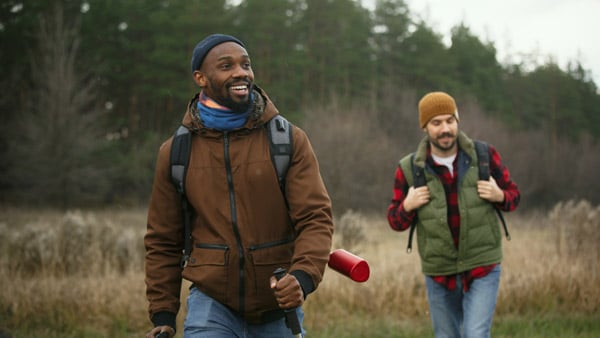Feeling lonely might be more common than you think. Loneliness has spiked over the past couple of years, with around a quarter of respondents to a CAMH survey saying they felt that way.
As a human connection expert, author and keynote speaker, I believe a lot of people I’ve talked to are taking stock of who their friends are, who their acquaintances are and who are the people that matter most in their lives. Some people have come to realize that they feel lonely within their current social groups.
Feeling lonely isn’t about how many people you have around you or how many friends you have. Feeling lonely means doesn’t always mean social isolation. Feeling lonely means YOUR needs for social connection aren’t being met and what this looks like is different for everyone.
Four common factors of loneliness:
- Lack of meaningful social support
- A negative perception of your relationships
- Poor mental and/or physical health
- A lack of work/life balance
The power of empathetic curiosity (i.e. the ability to ask the questions that feel someone’s reality instead of just trying to fix it) can be used to help break through feelings of loneliness. When you’re able to interact with people beyond small talk, it can help you feel more supported, connected and content. It’s also how good friendships can be formed while feeling less lonely in the process. Because the truth is, making friends as an adult can be hard!
If you’d like to expand your wolf pack – even if you’re not necessarily a “people person” – here are some ways to feel less lonely when you learn to connect with others in a meaningful way.
Ask first, talk second
Asking questions and listening to the answers is a great starting point for meeting someone. That way, there’s no need to have a dazzling talking point ready in your back pocket all the time. Let them do the talking!
Open-ended questions that start with “how” and “what” can lead to more personal answers. Here are some examples of “how” and “what” conversation starters:
- “What are you most grateful for?”
- “What’s one win from this week that you’re proud of?”
- “If you could live through the pandemic again, what would you do differently?”
- “How can I show up for you in bigger ways?”
- “What’s the question I failed to ask to understand your reality?”
Stay focused
There’s more to a rewarding first-time conversation than a single question and answer. That’s why it’s important to focus on the other person and not get distracted.
Part of this involves listening to what ISN’T being said. Does the tone of their voice sound angry, sad or excited? Listen with your eyes. Is their body language revealing clues about how they’re feeling? For example, avoiding eye contact every time a particular subject is mentioned—an ex-partner, say, or a former employer—is a sign that they may be struggling with something. Asking about that thing shows you’re paying close attention, which goes a long way toward strengthening new social connections.
Go bigger with small talk
After your initial exchange, build on what you’ve learned and noticed. “What are you looking forward to the most this summer?” or “How do you feel about being single/looking for work again?”
Deeper topics can lead to disagreements and differences of opinion, but this doesn’t have to be a conversation killer. In fact, the opposite is often true. Instead of taking issue with a topic, try to meet them where they’re at. By refraining from jumping to judgment, a conversation becomes a fun and interesting mutual exchange, not an off-putting argument.
Find out what makes people happy
Understanding what makes a person happy is a great starting point for connecting with someone. The late psychiatrist Dr. Gordon Livingston did incredible work on the happiness equation. He found that the happiest people had three things in common: They had something to do, they had someone to love, and they had something to look forward to.
If you don’t have any context for the person in front of you, ask them questions about these things to find commonalities and to get them to talk about themselves. What is this person all about? What are they excited about? How can I be a champion of what they’re doing? It creates a much more positive experience.
Walk and talk

Guys often feel more comfortable having deeper conversations when they’re side-by-side with somebody or while doing an activity. Connecting on a deeper level while looking someone directly in the eye can be uncomfortable.
That’s why talking while walking or getting active is a great way to build friendships. On that note…

No-Cost Counselling
Access three virtual counselling sessions at no cost through TELUS Health MyCare™. Available to men in BC, AB, ON and QC without extended health benefits.
Join the club
Pursuing your interests with other people who share the same ones is a great way to make new friends and gain a new appreciation for your chosen pursuit. Plus, a set schedule helps you make time for these activities.
Pick something you enjoy doing—bowling, watching sports, video games, barbecuing, hiking, playing darts, the list goes on—and chances are there’s a club, team or special event in your area that welcomes new members or participants.
Go out with your tribe
Being more social can be as easy as planning a night out with your buddies a couple of times a month. Go to a movie or the pub, head out for a walk or bike ride, or anywhere where you can hang out and have fun. Because our busy lives often get in the way of doing these kinds of things, it’s a good idea to set aside a regular time—say, every other Friday after work—for these get-togethers.
That’s right: Going to the pub can be GOOD for you—as long as you keep it real with the liquid courage. You never know who may show up. A friend of a friend could become part of your wolf pack by the end of the night.
Start a new friendship
As I already mentioned, it can be hard to make friends as an adult. Use the aforementioned tips to make a new friend at work, at the pub, at the gym, at your kids’ hockey practice, or anywhere else you meet and mingle with other people.
That way, you’ll have a new companion on your lunch break, a new friend to swap stories with at the pub, a new buddy to help you heckle the ref, you get the idea. You might be surprised how open people are to making new friends when you connect on a deeper level beyond small talk.
These kinds of friendships, it turns out, can help you live longer. They can also reduce stress, improve your mood, keep you mentally sharp, and help you get fit. In fact, a University of Pennsylvania study found that enrolling at a gym and exercising with a friend produced more weight loss than going it alone.
if you want to hear more from Riaz, he is featured in our Don’t Change Much Podcast on July 12, 2022.


Yes I did enjoy the article very much very helpful.
I have a very close friend I hang out with a lot. We had known each other for a long time we moved. I came back to my home town because our marriage separated. My friend & I have done a lot of connecting & talking about a lot of deep things & I enjoy our friendship. Would like to learn more ways of how to make more deep friendships.
Thanks for sharing, Kevin. Riaz is an amazing resource when it comes to the art of communicating in a meaningful way with other human beings. He wrote a book called “Every Conversations Counts” (link to it here). We also have him sharing more thoughts on this in a podcast coming up this Tuesday! You can check out more info on that here.
~Canadian Men’s Health Foundation team member
You could join a Men’s Shed. There are now more than fifty “Sheds” in Canada, and growing rapidly. A new Canadian Men’s Shed Association has just been formed.
I have belonged to Men’s Shed Vernon since it began in 2018, and highly recommend it for anyone who is challenged to initiate conversation.
Men’s Sheds are a great place to learn, make friends, and give back to your community.
Yes! We have heard really great things, Raymond. We have other articles on our website that recommend Men’s Shed. We would actually love to hear more about your experience! Can we contact you?
~Canadian Men’s Health Foundation team member